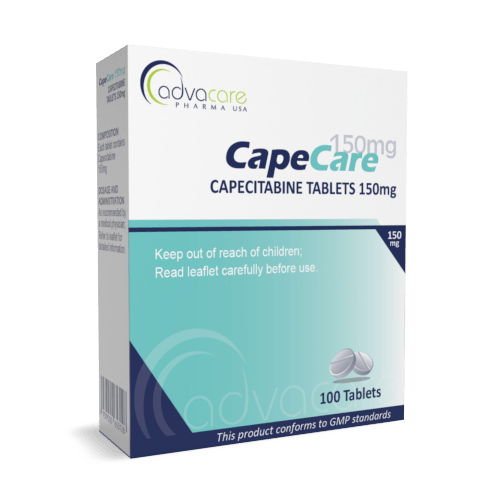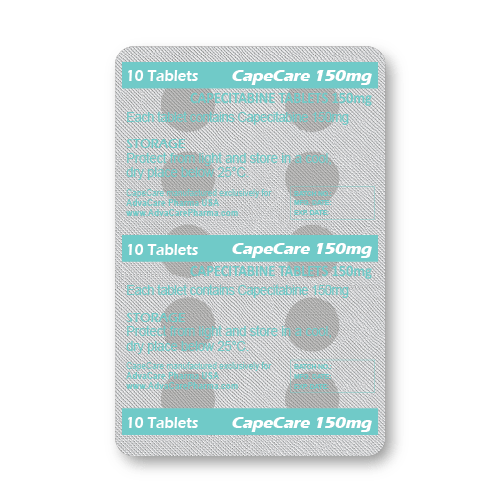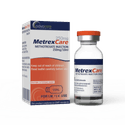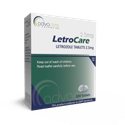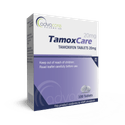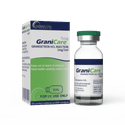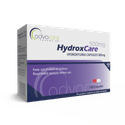- Home›
- Pharmaceuticals›
- Oncology Products›
- Oncology Tablets›
- Capecitabine Tablets
Capecitabine Tablets
Dosage
Packaging
What is Capecitabine?
Active Ingredients: Capecitabine
Capecitabine Tablets are an antineoplastic drug used to treat certain types of cancer, including colon cancer, breast cancer, and colorectal cancer. It is sometimes prescribed for cancer that has become metastatic. Capecitabine may be used alone or in combination with other chemotherapy treatments.
Capecitabine is classified as a nucleoside metabolic inhibitor and an antineoplastic agent. It is a prodrug, which is converted into fluorouracil within the tumor. It works by interfering with DNA synthesis within the cancer cells.
This medication is produced and exported by AdvaCare Pharma. Capecitabine Tablets is manufactured in our facilities in China, India, and the USA. Our factories comply with WHO guidelines and standards, and we regularly inspect these facilities to ensure they meet these high standards.
Why are we a trusted Capecitabine manufacturer?
AdvaCare Pharma manufactures Capecitabine Tablets, one of 40+ oncology treatments, according to rigorous GMP protocols at our state-of-the-art production facility. We are committed to producing quality-assured, cost-effective cancer treatments that meet the highest industry standards and are readily available to cancer patients worldwide. As an established Capecitabine manufacturer, we supply pharmaceutical distributors, hospitals and government institutions with reliable cancer drugs.
Uses
What is Capecitabine used for?
It is used to treat certain types of cancer, including
- colon cancer
- colorectal cancer
- breast cancer
Capecitabine may be used to treat cancer that has become metastatic.
How are Capecitabine Tablets used?
This medication is manufactured to be taken orally. This medicine should be taken with a meal or 30 minutes after eating.
What dose should be taken?
For stage III colon cancer (adjuvant), the usual dose is 1250mg/m², per dose, given twice a day during days 1-14 of a 21-day cycle. Repeat for 8 cycles.
For metastatic colorectal cancer, the usual dose is 1250mg/m², per dose, given twice a day during days 1-14 of a 21-day cycle.
For metastatic breast cancer (refractory or relapsed), the usual dose is 1250mg/m², per dose, given twice a day during days 1-14 of a 21-day cycle. When combined with lapatinib, the dose should be decreased to 1000mg/m²/dose. When combined with neratinib, the dose should be decreased to 750mg/m² per dose.
Refer to a doctor or pharmacist for guidelines on dosage.
Side Effects
As with all pharmaceuticals, some unwanted effects can occur from the use of Capecitabine Tablets.
Common side effects include, but may not be limited to:
- gastrointestinal effects (nausea, vomiting, diarrhea, abdominal pain)
- tiredness or weakness
- hand and foot syndrome
- jaundice
Seek medical attention if the following develop:
- severe or bloody diarrhea
- severe nausea or loss of appetite
- continuous vomiting
- high fever
- sores or ulcers in the mouth
- jaundice
- symptoms of dehydration
- hand and foot syndrome
- signs of a heart problem
- signs of low blood cell count
For a comprehensive understanding of all potential side effects, consult a medical professional.
If any symptoms persist or worsen, or you notice any other symptoms, please call your doctor immediately.
Precautions
Do NOT use Capecitabine Tablets if:
- You are allergic or hypersensitive to any of the ingredients.
- You are allergic to fluorouracil.
- You have severe kidney disease.
This medication may not be suitable for people with certain conditions, including:
- DPD (dihydropyrimidine dehydrogenase) deficiency
- liver or kidney disease
- heart problems
- current treatment with a blood thinner, such as warfarin
- regular "INR" or prothrombin time tests
This medicine may harm a fetus if the mother or father are being treated. For women, use efficient birth control at least 6 months after the last dose of Capecitabine. For men, use effective birth control at least 3 months after your last treatment. If you or your partner become pregnant, inform a doctor as soon as possible. Do not breastfeed while undergoing treatment with this medicine.
Many drugs are known to interact with Capecitabine, so be sure to check with a doctor before beginning treatment.

You might be interested in...
Why AdvaCare Pharma?
As an industry leader, we are aware of our responsibility to provide affordable and sustainable solutions to improve healthcare worldwide.
